Bulungula, Part Three and The End
While we were at Bulungula, we opted to go on a tour of the village. The tour was led by one of the girls who lived in the village. (For the life of me, I cannot remember her name, so I will just have to refer to her as our tour guide. I have a bad habit of hearing someone’s name, and promptly forgetting it two seconds later. This bad habit is exacerbated by any names that are extra foreign to my ears). We were joined on the tour by Abraham and Josephine, two Americans who were practically our neighbors. They are from Columbus, Ohio, and are also traveling around the world. (By the way, Abraham and Jo – if you are reading this, send me an email. We lost your contact information!)
The village is made up of Xhosa people. The language that they speak is also called Xhosa. When I read that the language features clicking sounds prior to coming to Bulungula, I naively assumed that everyone spoke with just clicks, which I thought would be impossible to understand. As usual, my idiotic assumptions were proved wrong once again. When speaking Xhosa, certain letters are accentuated with a click of the tongue.
People in the village lived in rondavels, not unlike the ones in which we were staying. The floors are made up of cow dung, which is periodically reapplied to keep the dust down. The roofs are thatched together from natural materials. I only took a few pictures on the tour. Even though I knew the whole community is part of the Lodge and is a willing participant on the tour, it still felt odd to intrude and ogle at people’s lives anymore than we already were.
Our first stop on the tour was to visit the healer, an elderly woman whose hut was in a prime location with seaside views, demonstrating her important role in the community. I wasn’t quite following what she did, exactly, but got the gist that she has dreams, which helps her to heal people. We sat on the ground with her next to the chicken coop, trying to avoid sitting directly in the chicken poop, and had as much back and forth conversation as one can have between people who speak English and people who speak Xhosa. Our guide occasionally translated, but didn’t facilitate a lot of back and forth, which made for a lot of awkward smiling.
Next, we went to visit a family in a hut. Josephine and I were promptly directed to join the women sitting on a mat on the cow dung floor, while Sean and Abraham got chairs on the other side of the room. Apparently once a woman marries, she can no longer sit on the same side of the room as men. One of the women showed Josephine and I how to grind corn on the giant stone that they use to prepare their meals. I, at least, failed miserably. I ended up just sort of chucking the little stone towards the big one, instead of making graceful swipes. We asked some questions which our tour guide relayed, and learned that about 11 people lived in the hut, from newborn to adult. They all slept on mats on the floor. On one side, they had shelving with some staples for food – corn, rice, etc. – and on the other side, three chairs, but that was it.
After visiting for about twenty minutes, our tour guide told us it was time to move on. We said good-bye and left the hut. On our way out, we paused outside to look at their dinner cooking on the fire. The people in the village typically eat various forms of pap, which is a thick porridge like dish with spinach or cabbage.
All four of us were under the impression from our tour guide that we were moving on to another place in the village, but she turned and went back into the rondavel, motioning for us to follow her. Sean and Abraham were once again directed to the chairs, and Josephine and I were once again directed to the floor. I thought we were leaving? I heard Abraham say in a half-whisper to Sean. It didn’t take long for the realization to set in that we were now joining them for dinner. I’m not sure how that happened. Did something get lost in translation? Did we unknowingly agree to this? One of the woman brought in the pot of pap that had been cooking outside. She dished out some of the pap into one bowl, and handed it to Sean, Abraham, and a teenage boy, along with three forks. Oh, I guess we’re staying for dinner, Abraham said. Guess so, said Sean.
As soon as a woman brought over a dish of brownish looking water, I started to suspect what was going to happen next. The women passed the dish of water around, using it to clean their hands. I’m not sure what was worse; using that water to “wash,” or just eating without washing even though we just had been sitting outside next to the chicken coop. Josephine and I accepted the water and gingerly stuck our hands in for a brief moment before smiling awkwardly and passing it on. Meanwhile, from their elevated position across the room, Sean and Abraham were eyeing up the water and wondering what was going on. Why do they get water and we don’t? Sean wondered out loud as a woman dumped a pile of the pap into a large bowl. As it was set in front of the group of women on the floor, Abraham chuckled and said with a smirk, Because we get forks and they don’t!
As the boys shared amusement, the group of women started digging into the communal bowl of pap with their hands and eating it. Josephine and I exchanged looks and reluctantly grabbed as small of portions as we could without looking rude and put it in our mouths. Abraham, counting on the inability of everyone in the room except us to speak English, was spot on when he said out loud, Wow, this tastes just like sand. The pap was gritty and mushy at the same time. Other than a taste of boiled spinach, it was near flavorless. I concentrated on sticking to a portion of the bowl closest to me that I was pretty sure was untouched by anyone else, but as the pap dwindled, so did any hopes of sticking to one segment.
While everyone was eating, the room was silent, except for a few comments exchanged back and forth between Sean and Abraham. I stole a glance at Josephine, and was relieved to see that she, too, was eating tiny bites spaced out from each other as much as possible. Meanwhile, the other women were scooping up much larger bites much more quickly. I felt awful eating their dinner, when they have so little to eat and when we had a big, delicious dinner waiting for us back at the lodge. I felt awful for hating the food, when this is what they eat for all of their meals every single day.
My reverie was interrupted by one of the women speaking to Josephine in Xhosa. Josephine, likely unsure what she was saying, just smiled and tried to pantomime that the temperature of the pap was hot. One of the women got up, got a smaller bowl, and scooped some pap into it. She handed it to Josephine and motioned for her to go outside. Unsure about what was going on, Josephine stood up and said, okay, I guess I’ll take this outside. She was gone for about a minute, and then returned and set it back down. Thanks, now this is cooler, she said to the women, but looking at me with a what-in-the-hell type expression. She then said, why don’t you help me eat out of this bowl, since it is cooler and all. I nodded. How much of this do you think we have to eat? I muttered out of the corner of my mouth. I have no idea, she muttered back. I felt relief to only have to share a communal bowl with Josephine. Meanwhile, this made no sense, considering I had just met her about an hour before.
At some point, we decided we had ate an acceptable amount and offered our bowl to the other women sitting around us. Our tour guide then told us it was time for us to move on. We thanked the family for sharing their dinner, and then said goodbye for what we hoped was the last time.
We then toured the classrooms in the village. The schools are funded by Woolworths, a large department and grocery chain throughout South Africa. In contrast to the rondavels, the classrooms were bright and sunny.
After our classroom tour, we went to visit the headman of the village. We joined him outside, where he was sitting with his children. With the help of the translator, we learned a little bit about his role in solving village disputes. After the visit with the headmen, we went to one of the village’s shabeen. Like many villages, the locals brew their own beer. They weren’t brewing on this particular day, so we didn’t get to try any. Which probably isn’t that disappointing, based on what I have read. I was expecting the shabeen to be a like a bar, just in a rondavel, with people sitting around on mats or chairs. The one we visited looked to be someone’s house. The hut was much more chaotic and messier than the one in which we tried the pap. There were people everywhere – women, small children, really small children, and the only adult man we saw in the village other than the headman. The babies in the village don’t wear diapers, and the one in this hut crawled around the dung floor with only a shirt on. There are also animals everywhere. Like the baby, cats and chickens crawled around the rondavel. In one “corner” (there are no actual corners, since the rondavels are round) we saw the pot where they normally brewed the beer. The local corner dive bar at home, this is not.
Most of our visits with the villagers, who were all black, were focused upon Josephine. The people in the village were fascinated by her. She is American, but her family’s national origin is Taiwanese. This caused much confusion with the villagers. They want to know where you are from, our guide related. We’re all from the United States, one of us would answer. Our guide relayed the information, and always came back to Josephine with another question: But where are YOU from? A steady stream of white Americans and Europeans must go through the village as part of the tours, but people who are Asian in appearance must be less common. Apparently an Asian woman had traveled to Bulungula some time back. You look like her, our guide translated to Josephine. You are so beautiful.
When we returned to the lodge, suddenly the compost toilets, rocket showers, and beds with mildewy pillows started to look like luxuries. The people in the Nqileni Village have no toilets at all, no running water, no electricity, no clean drinking water, no access to healthcare. Because a municipal access road has never been built, the nearest health clinic is hours away on foot or by 4×4 vehicle (which, of course, few people have). Over half of the approximately 750 people in the village are children. The vast majority of the people in the village do not have basic literacy or numeracy skills. Other than working for the lodge or with a business supported by the lodge, their only source if income is to send an adult male to work in the mines in Johannesburg, over 12 hours away. It is sobering to encounter such poverty close up. I am glad for a place like Bulungula, which at least provides some income and attention to people ignored by government. They also have started the Bulungula Incabator, a non-profit organization to try and address some of the problems in the Nqileni Village.
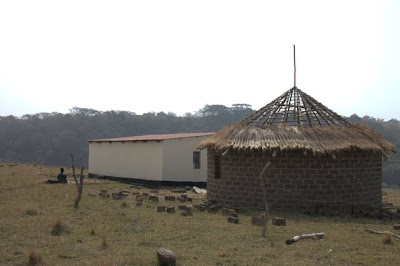

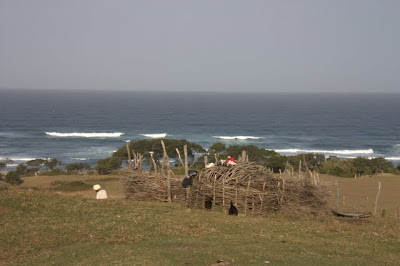
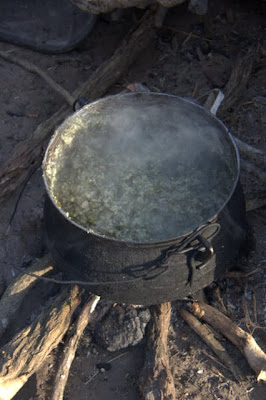
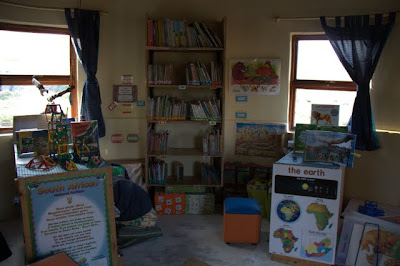
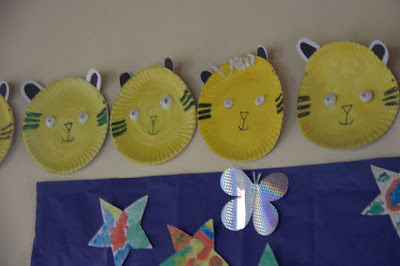
Wow, good job choking down that stuff…don’t know if I could have done that! This sounds like it would have been quite an experience. It’s cool you gained some insight, and sad that nobody gets education.